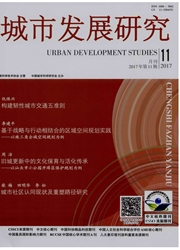

 中文摘要:
中文摘要:
通勤是城市居民的基本交通需求,随着经济社会的快速发展,通勤负担的社会分异现象日益显现,制约着居民生活质量提升和社会公平的实现。基于天津市居民通勤特征调查数据,构建两种通勤负担模型,比较分析不同社会群体的通勤负担,实证结果显示:党政机关或事业单位工作人群通勤负担较轻;年龄和学历与通勤负担呈负相关;非天津户口、以私家车为通勤方式居民通勤负担较重;低收入、非天津市户口居民空间失配现象显著。研究结论表明,城市政府在关注居民整体通勤效率提升的同时,也应采取相应政策和措施,积极应对不同群体通勤负担分异问题。
 英文摘要:
英文摘要:
Commuting is basic traffic demand of urban residents,and the level of commuting burden affects residents' life quality and social equity. Based on the survey data of Tianjin residents' commuting characteristics in 2015 and constructing two commuting burden models,this paper analyzes commuting burden among different social groups. The empirical results are as follows: the group from the Party and government organs or public institutions take lower commuting burden comparatively,both age and education are negatively correlated with commuting burden,the group commuting by private cars and the group without local Hukou bear heavier commuting burden relatively,there is a serious jobs-housing mismatch among the low-income group and the group without local Hukou. Urban transportation policy maker not only should focus on commuting efficiency,but also should pay attention to the difference of urban residents' commuting burden.
 同期刊论文项目
同期刊论文项目
 同项目期刊论文
同项目期刊论文
 期刊信息
期刊信息
